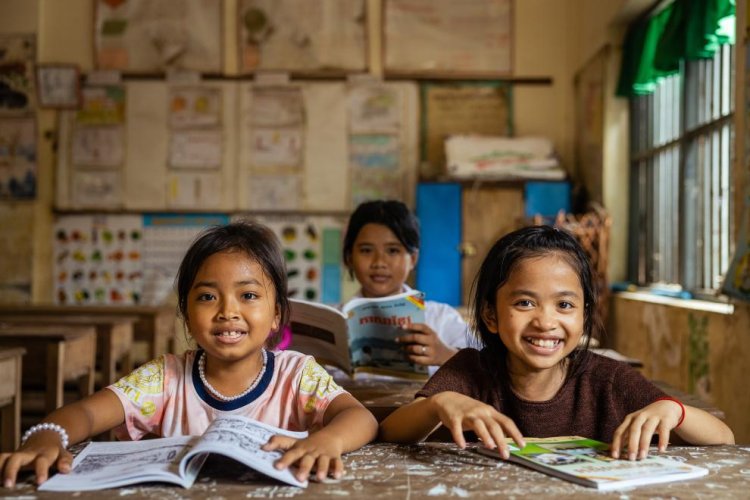Education
Children in a society are provided the opportunity to acquire fundamental academic information, learning skills, and cultural norms through the medium of an educational system, which is a social institution.

EDUCATION
What is Education? Meaning, Types, Functions, and Approaches
What is Education?
Children in a society are provided the opportunity to acquire fundamental academic information, learning skills, and cultural norms through the medium of an educational system, which is a social institution.
Education is an essential component of human life and cannot be separated from it. Without it, the existence of a human being would be barren, miserable, and without hope. Deliberate instruction or training is what this term refers to. The Latin word "educare," which literally translates to "bring up," is where we get the English word "education."
The goal is to instill in the student not only the knowledge necessary to function competently in certain domains, but also the behaviours and mindsets necessary for him to successfully navigate the world beyond school. Therefore, education does not only mean having the ability to read and write; rather, it refers to the process of an individual's maturation into a state of harmonious development. As a result, M.K. Gandhi characterised education as "a process that brings out the best in human beings in all aspects of their being, including their body, mind, and spirit."
It is a vital instrument in the process of fostering societal advancement. It is of the utmost importance to encourage development and change in society. Education is an absolute necessity if a nation wishes to improve its economic situation, make the most of its available means and resources, and keep the bonds of brotherhood strong throughout its population. Education is regarded as fundamental by the United Nations as a means of enriching the quality of human existence and ensuring the progression of both society and the economy.
Definitions:
- According to Durkheim, education is nothing more than the process of socialising younger generations. In addition, he says that "it is a continuous effort to impose on child ways of seeing, feeling, and acting that he could not have spontaneously arrived at."
- Education is the culmination of all of a person's experiences, and it is these experiences that shape their attitudes and influence how they behave as adults and as children. - J.S. Roucek & F.J. Brown
- According to the work of John J. Macionis, "Education is the Social institution guiding a society's transformation of knowledge including basic facts, job, skill, and cultural norms and values to its members."
Types:
There is more to education than simply imparting the fundamental academic knowledge that one acquires through classroom instruction. In addition to receiving an education in the traditional classroom setting, students in societies impart life skills and knowledge to one another in other settings. Formal education and informal education are the two categories of learning that are distinguished by their respective names.
Learning academic facts and concepts through the use of a structured curriculum is what is meant by the term "formal education." However, the beginning of the more structured ways of learning may be traced back only a few hundred years. Before the turn of the third century, only a small percentage of the population was literate. In times past, only those who belonged to higher social levels could receive an education. In today's society, receiving a fundamental education is regarded as both a right and a responsibility for all citizens.
Learning about cultural values, customs, and expected behaviours through participation in society is what we mean when we talk about informal education. This kind of learning takes place in the house, and it involves participation from the parents, other family members, and the neighbourhood. Informal education teaches us how to dress appropriately for various events, how to make food, how to behave appropriately towards others, and how to understand the ethics of life, which includes the social and cultural standards, values, and morality.
Functions:
The following are some of the functions it serves:
Education plays an important role in completing the socialisation process; despite the fact that families have children, modern families have access to schools and other institutions that have largely taken the position of families in the role of completing the socialisation process.
It is possible to transfer the culture of the society: through the release of books and through the teaching and learning process. This helps to ensure that the culture is passed down from generation to generation.
Education makes it possible for a person to have a social personality. The social personality of an individual can be developed through schooling.
It assists in the reformation of attitudes: Through education, antiquated and outmoded attitudes can be changed, and new ones can take their place.
It assures or provides an environment that is conducive to getting the work done: Education is the most essential social institution, and it plays a significant role in securing employment. carries with it the status:
It bestows status on persons: In today's world, it bestows status on individuals.
It promotes democracy: by ensuring that the people have access to the education they need to comprehend democracy and put its principles into practise for the benefit of both themselves and society as a whole.
Education instills values; it adds meaning to the lives of individuals and ensures that their lives are guided by moral principles.
Education fosters the development of a wide range of concepts and worldviews, which in turn promotes the progression of social change.
Theoretical Approaches to Education
The following is a list of the several ways in which sociologists think about the function (or role) of education:
Functionalist Approach to Education i.e. Functionalism
The belief held by functionalists is that the purpose of education is to fulfil the requirements of society by preparing pupils for later duties or responsibilities in society. They contend that education performs two distinct sorts of tasks, namely:
Manifest functions, also known as the intended and visible functions of education, include things like socialisation, integration, finding jobs, teaching students to conform to laws and rules, and respect for authority, all of which are utilised later on in the workplace and the community in which they live.
Latent functions are the hidden and unintentional functions of education, such as child care, the creation of peer relationships, the chance for social and political activism, as well as the ability to develop tolerance to other ideas, as well as other functions.
Conflict Approach to Education
In contrast to the perspective held by conflict theorists, who believe that education serves a role that contributes to social conflict, functionalists believe that education plays a positive role in society. Education, in the eyes of conflict theorists, is a tool for furthering social inequality because of the prevalence of "tracking" and "standardised testing," as well as the influence of education's "hidden curriculum." They hold the belief that the educational system is responsible for reinforcing and maintaining societal inequities such as class differences, gender differences, and racial and ethnic differences. Additionally, they assert that the schools condition pupils from working-class families to acknowledge and embrace their status as lesser members of society.
According to conflict theorists, the privileged classes and groups use education (the curriculum) as the means through which they impose the elite or high-class values on the disadvantaged or lower status people and groups. They believe that the values, beliefs, and lessons that education carries are of a high class and that this does not correspond to the students who come from lower classes since he or she is unable to do the homework owing to the fact that he or she must help the parents in economic activities. When compared to children from lower classes, children from higher classes tend to have higher levels of competitive ability and skills due to the circumstances described above. As a result, inequality exists because children from higher-income families are more likely to hold prominent positions and take advantage of more privileged possibilities.
According to the contentions of conflict theorists, educational inequalities such as differences in funding, resources, and the atmosphere of the classroom all contribute to discrepancies in students' levels of academic achievement, which in turn serve to perpetuate social inequalities.
The conflict theorists also point out that labelling pupils as bright (high achiever) or dumb (low achiever) perpetuates societal inequalities, and the worst of it is that the low achievers/performers spent their entire lives being looked down upon and humiliated for their lack of accomplishments. They contend that students' socioeconomic class, race, and ethnicity, rather than their intellectual skills, should determine where they are placed in the classroom. The upper class and the middle class are brought closer together, while the lower class is brought further apart. Once they are monitored, kids learn more if they are tracked up and less if they are tracked down. This is because students who are tracked down have a tendency to experience a loss of self-esteem and begin to believe that they have a low level of academic aptitude, which causes them to do worse in school.
Therefore, according to conflict theorists, educational institutions help to sustain the status quo, which is the existing scenario in which the upper-class elites retain their culture of dominance and control over the lower-class and working-class members of society.
Interactionist Approach to Education
Interactionists investigate the dynamics of the classroom, including the interactions that take place between students and teachers, as well as how these relationships influence students' academic achievement and their lives outside of school.
This viewpoint emphasises on the social interactions that take place in the classroom, on the playground, and in other areas of the school. According to the findings of research, social interaction in schools, such as interactions between teachers and students, can have an effect on how much pupils learn. Research has shown, for instance, that when teachers have a positive impression of their pupils' intelligence, they are more likely to spend more time with those kids, call on them, and applaud them when they offer the correct response.
These pupils learn more as a direct result of the actions of their professors, which is not surprising. However, when teachers have a negative perception of their students' intelligence, they are more likely to spend less time with those students and to behave in a way that makes it more difficult for them to learn. In yet another example, a research indicated that teachers are more likely to call on and commend boys. Teachers may not want to convey this message to their students, but the way in which they act conveys the idea that maths and science are not for girls and that girls are not cut out to excel in these fields. Because of this, girls tend to perform poorly in subjects like mathematics and science.












